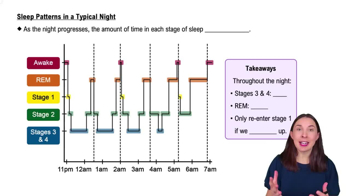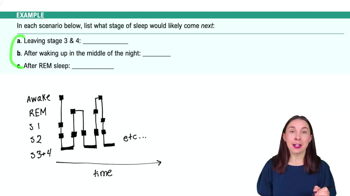Table of contents
- 1. Introduction to Psychology1h 43m
- 2. Psychology Research2h 20m
- 3. Biological Psychology2h 41m
- 4. Sensation and Perception28m
- 5. Consciousness and Sleep32m
- 6. Learning41m
- 7. Memory34m
- 8. Cognition37m
- 9. Emotion and Motivation35m
- 10. Developmental Psychology33m
- 11. Personality48m
- 12. Social Psychology41m
- 13. Stress and Health41m
- 14. Psychological Disorders44m
- 15. Treatment47m
5. Consciousness and Sleep
Sleep
Struggling with Psychology?
Join thousands of students who trust us to help them ace their exams!Watch the first videoMultiple Choice
The higher the body temperature, the _____ people are.
A
calmer
B
more alert
C
sleepier
D
more aggressive
 Verified step by step guidance
Verified step by step guidance1
Identify the relationship between body temperature and psychological states. Consider how physiological changes can influence mental and emotional states.
Understand the concept of arousal in psychology, which refers to a state of being physiologically alert, awake, and attentive.
Consider how an increase in body temperature might affect arousal levels. Higher body temperature can lead to increased metabolic rates, which may enhance alertness.
Evaluate each option in the context of increased arousal: 'calmer' suggests reduced arousal, 'more alert' suggests increased arousal, 'sleepier' suggests reduced arousal, and 'more aggressive' suggests increased arousal but in a different context.
Determine which option best aligns with the concept of increased arousal due to higher body temperature, focusing on the direct relationship between physiological changes and alertness.

 3:25m
3:25mWatch next
Master Circadian Rhythms with a bite sized video explanation from Hannah Gordils
Start learningRelated Videos
Related Practice


































































































![Race, Genes and IQ Differences | Bret Weinstein [Mini Clip]](https://img.youtube.com/vi/IztL_m3pd70/mqdefault.jpg)



































































































